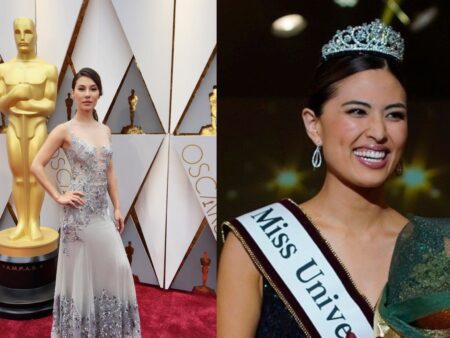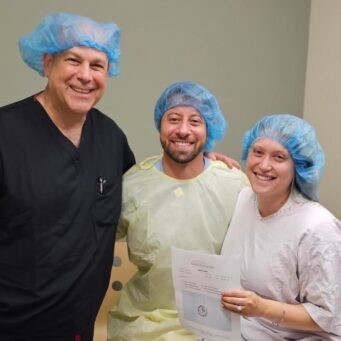
Let’s get one thing straight: I know how sex works. And I know that when a sperm meets an egg, a child may occur. Yet, when people find out I’m a single mom, I find myself over-explaining, as if it seems I didn’t understand the fundamentals.
It would be one thing if I identified strictly as a single mom by choice. But I don’t. When I became accidentally pregnant at age 30, becoming a mother was the farthest thing from my mind.
So I tell the truth: I had been traveling, I hadn’t renewed a birth control prescription, I had misjudged my cycle, and the morning-after pill isn’t 100% effective. I had always wanted children eventually, so I made the decision to continue the pregnancy on my own, without the involvement of the father.
Think I’ve already over-shared? Well, if I don’t tell the story of how I became pregnant with my daughter, Lucy, I find that people fill in the gaps themselves, imagining a life far more dramatic and way less accurate than the truth. Often, I go on to disclose that I had been traveling abroad for what was supposed to be a yearlong research trip for a novel, and seven months in got unexpectedly pregnant from a one-night fling.
Instead of letting people assume that I have a bad relationship with an ex, that I may be relying on family help, that I’m struggling (none of which are true), or having to answer too many questions — No, her dad isn’t in the picture. Yes, I will give her the full story in an age-appropriate manner. No, I don’t consider myself pro-life — I try to tell them everything up front.
Maybe friends are trying to be well-meaning when they ask how I’m coping. Maybe the mom at daycare asks about how I handle expenses because she hopes that Lucy will be able to continue with the group. But I still bristle. Sometimes, with new acquaintances, I want to immediately pull out my tax forms, just to dispel the struggling single mom stereotype once and for all.
If I’ve learned anything from my two years of being a single mom, it’s that the phrase “single mom” doesn’t define me at all.I’m pretty defensive because if I’ve learned anything from my two years of being a single mom, it’s that the phrase “single mom” doesn’t define me at all. I’m single, and I’m a mom. They’re two separate parts of my identity.
I share common issues with many moms. I struggle balancing work and time with Lucy. I spend a lot of time Googling environmentally-friendly sunscreens. I worry about how she’ll handle her middle school years, even though it’s a decade away.
I also share the problems that many single women have. I continually install, delete and re-install Bumble on my phone. I’ve sat through awkward set-ups coordinated by well-meaning friends. I want to find love and wonder where and how it’ll fit in my already full life.
What drives me absolutely nuts is that my married friends avoid this scrutiny. When people see them — the mom, the dad, the toddler — they automatically assume everything’s fine. My anger and disappointment started in the hospital right after I had Lucy.
A social worker was sent to see me on two occasions, and I was asked detailed questions about my employment history and future job prospects. After exchanging birth stories with my married friends, I know they didn’t have a social worker visit. And I’m not projecting. The physician’s assistant explained the visits to me: We do this for people who don’t have partners.
My disbelief and resentment grew in my new-mom groups. All of my new mom friends and I were struggling with lack of sleep, confusion over nap schedules, figuring out how to find babysitters. I knew from a group text chain that one of my married mom friends in the group was crying nightly, another was obsessive about her daughter’s nap schedules, panicking if she forgot to log one into an app on her smartphone. But I was the one pulled aside by the new mom group leader at the end of a meeting, to see how I was really doing. In comparison, I felt like I was actually doing pretty well. Yet I felt like I had to bend over backwards to prove to outsiders that I was okay.
It may seem odd, but I admit that there are times I go out of my way to undermine a married mom in conversation, to show that even though she may have help, I’m doing better than she is.
I was recently on a panel at the new-mom’s group that I had attended when Lucy was an infant. I, along with several married mom panelists, was there to give pregnant parents the inside scoop on choosing childcare. When it was my turn to speak, I talked about how easy maternity leave was, how it felt like a vacation, how having a child in your life was no big deal.
It was a lie. I only said that because the two moms before me had talked about how sleep-deprived their first few weeks were. I couldn’t help myself; I wanted to show that I was different than them, better than them.
Of course, I felt only more alienated. Instead of trying to connect, I had displayed weird one-upmanship that made me feel more separate from the other neighborhood moms.
It was a turning point. I realized I needed to make some changes.
Instead of trying so hard to prevent misconceptions about my life as a mom, now I wait for the probing inquiries and respond with a curious: “Why do you ask?”
My sideways glance also indicates that I know — and more importantly that they now know — that it was an invasive ask. But sometimes, I get widened eyes, followed by a reason for the questioning: They’re struggling. They find the balance tough. They’re looking for someone — not a single mom, just another individual — who can listen.
I realized and am now more aware that just like some people had been lumping me in the single mom category, I’d been lumping them in the married mom category. In my mind, married moms couldn’t have it that hard. I never thought about whether their partners were supportive or whether they were dealing with their own personal challenges.
Bottom line: Every road to parenthood — single, coupled, whatever — is unique. Some are rocky, some are smooth, but each is different. The more we realize that that is our only commonality and we all stop making assumptions, the better.
Until then, let’s make a deal: You stop asking me questions about my daughter’s conception and I’ll stop trying to one-up you in mom group.
Contributor
Anna Davies
Anna Davies lives in Jersey City, NJ, with her two-year-old daughter, Lucy. An author of 15 young adult novels, Anna has also written for The New York Times, New York, Elle, Glamour, Men’s Health, Women’s Health, and others, and has held staff positions at Cosmopolitan and Redbook.

Listen to stories, share your own, and get feedback from the community.


















